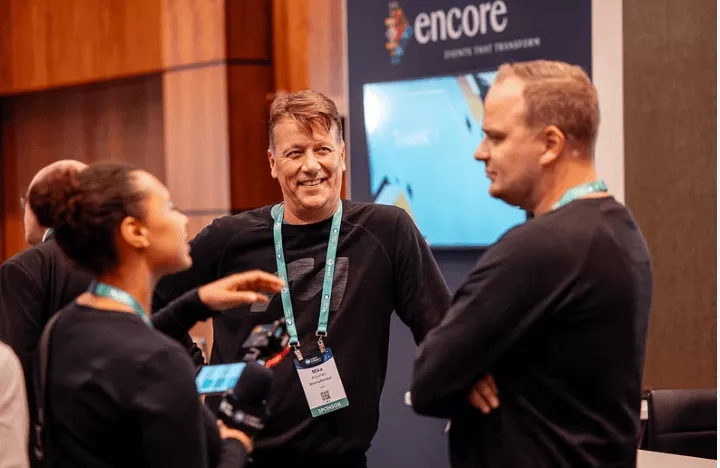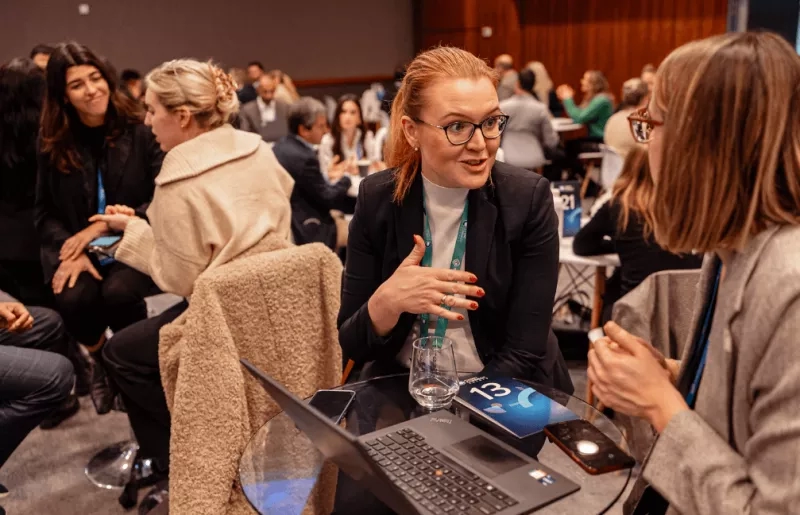
Networking at conferences is a valuable opportunity to build professional relationships, expand your network, and gain insights and knowledge from others in your field. Connecting with others lets you learn about new job opportunities, potential collaborations, and event industry trends.
Ever walked out of a conference with a pocketful of business cards and a nagging feeling you missed the point? Networking can feel as exciting as… well, watching paint dry.
But what if it didn't have to be that way?
In this post, we'll discuss everything about conference networking, from what it is to how to facilitate it and everything in between so you can turn those fleeting encounters into dynamic, lasting connections.
What is Conference Networking?
Conference networking involves meeting other attendees to build professional relationships, exchange information, and create opportunities for collaboration. Of course, you cannot meet everyone or attend all the sessions, so the engagement has to be strategic, and you must prepare beforehand.
12 Ways to Prepare For Conference Networking
Just a few right networking tips can be the difference between a good conference experience and a great one. Here are our top tips:
1. Make Your Agenda Clear
The number of people attending conferences, trade shows, and seminars can make the entire event experience overwhelming. To stay focused, prepare an agenda in advance and prioritize your time. Identify the sessions you want to attend, the people you want to meet, and the goals you want to achieve.
2. Do Pre-Event Research
By researching the presenters and attendees before the event, you can start building relationships even before the event starts. Google what they are working on, learn more about them from their LinkedIn profiles, and read their company news. Doing this prep signals that you respect the person you are meeting and will allow for a productive conversation.
3. Connect with Attendees Before the Event
Connect with key people on social networks before the conference. If possible, send them emails expressing your interest in meeting them. Engaging in pre-event conversations makes your actual meetings less awkward and more productive.
4. Calendarize Your Schedule
Once you have finalized your conference agenda, calendarize it. Having all the important activities on your calendar will ensure you stay organized and don't miss any opportunities. Prioritize your schedule to focus on quality interactions rather than trying to attend everything.
5. Use the Power of Event Apps
Mobile event apps can significantly improve your networking experience by offering valuable features like meeting schedulers, session calendars, QR code contact sharing, chat, live feeds, and roundtables. Use these features to connect and share information asynchronously before, during, and after the event.
6. Prepare to Break the Ice
More often than not, you will need to initiate conversations. This is particularly true if you are not a higher-up executive. So, have a few icebreakers ready to start and sustain meaningful discussions.
7. Ask Leading Questions
Engage others by asking thoughtful questions about their interests and experiences at the conference. Your pre-event research will come in handy here. Avoid small talk and aim for deeper conversations leading to long-term connections.
8. Sign Up for Sessions
Register for as many relevant sessions, meet-ups, and dinners as possible. As most of these sessions have limited capacity, they provide exclusivity and offer excellent opportunities for socializing and networking. Reach out to the conference organizer for more details and attend only those sessions with your person of interest.
9. Know When and How to Bail Out
Not all conversations will be fruitful. Some can drag on and take up your precious time. Others might make you wish you had never initiated the conversation. Either way, plan your exit strategy. You can follow this easy-to-remember formula from the Science of People: "Genuine compliment + Follow-up Item + Handshake = Lasting Impression."
10. Explore the Virtual Venue
For virtual conferences, familiarize yourself with the event platform beforehand. This preparation lets you focus on the event and networking rather than wasting time trying to understand the technology.
11. Focus on Your Badge and Business Card
Wear your company badge prominently and have business cards ready to effectively connect with relevant people. Digital business cards are also useful for quick and easy contact sharing.
12. Take Notes at Meetings
Taking notes during conversations helps you remember key points for follow-up communications. Networking event platforms often have features for making private notes and tags, ensuring easier ways to continue conversations post-event.
Why Is Networking at A Conference Important?
Networking at conferences lets you meet new people in your industry and establish valuable connections. In fact, 95% of people say face-to-face meetings are key to successfully building and maintaining long-term business relationships. You can learn new trends, industry developments, and techniques at conferences and exchange ideas and information. It's also an ideal place to find potential clients, collaborators, and partners.
Top 3 Common Mistakes to Avoid in Conference Networking
While the tips mentioned above are the things you must do when networking at offline or virtual conferences, here are a few things you must avoid:
1. Staying Silent or Talking Too Much
Some silence during conversations is normal, but if there's too much of it, people might think you aren't paying attention. Conversely, talking too much or over others can put people off. Strike the right balance and avoid asking yes or no questions, as they can be a conversation dead-end.
2. Being in An Uncomfortable Situation
If you encounter someone rude, who behaves inappropriately or makes you feel uncomfortable in any way, in such situations, politely thank the person for their time and excuse yourself from the conversation. You are not obligated to remain in a conversation that makes you feel uneasy.
3. Asking for a Job
This is an absolute no—never ask for a job. Networking is for developing relationships and not finding jobs, especially at conferences. Focus on learning more about the person you're talking to, gaining information about their product/service, or seeking advice.
Frequently Asked Questions
Networking at conferences can be daunting. As a result, we've prepared some common questions and answers so you can be prepared for anything.
How Do You Facilitate Networking at Events as an Organizer?
If you are an event organizer and want to create a memorable event for your attendees, here are a few conference networking ideas for event organizers.
Use Your Social Channels
According to reports, 62.6% of the world's population is on social media channels. Chances are your attendees are there too. So, as an event manager, use your social media accounts to facilitate networking. Start by setting up an event page and promoting it along with speaker profiles. You can also use social media community pages where attendees can stay updated or run contests on different platforms.
Focus on the Venue Layout
Whether it's a virtual, physical or hybrid event, focus on the venue layout or networking event platform. The last thing you want is for your attendees to feel lost. Navigating the event space, whether to different sessions or booth, should feel natural. Put up arrows, posters, or standees or have interactive floors on the event mobile app for easy navigation.
Group-Focused Activities
Group activities can make people step out of their comfort zone and meet new people. Think of team games, roundtables, or speed networking. For online events, use a virtual conference platform that offers gamification so you can host team quizzes, leaderboards, scavenger hunts, and more.
Introduce Speed Networking
This is the most effective and proven way to facilitate networking. Speed networking works for offline and online events and can unite two like-minded people. Set up a time for attendees to have brief, one-on-one conversations with multiple people with similar interests quickly.
How Do You Engage People in a Conference?
Attendees expect networking at events. That's one of the top reasons why they attend it. To keep your audience engaged, follow these tips:
- Have a moderator who can engage your audience with icebreakers and anecdotes.
- Opt for conversational formats like roundtables or use conference management technology with tools like live polls and Q&A to facilitate engagement.
- If time permits, allow for 1:1 sessions with experts. Designate a 5-minute 1:1 session slot between main sessions and notify attendees during registration. Allow attendees to send their questions so the speakers can come prepared and have a meaningful dialogue.
How Do You Network After a Conference?
Networking isn't a one-time thing. Sure, the initial meeting at a mixer or chat after a talk is important, but it's just the beginning. Here's how to turn those connections into long-term wins:
Soon after the conference, send a quick email thanking the person for their time and mentioning something specific you discussed. If they mentioned wanting something like your presentation or product flyer, include it in the email.
Keep the conversation flowing. Suggest a follow-up call or Zoom chat to "pick their brain" further and explore collaboration opportunities. Fifteen to twenty minutes is plenty to keep the momentum going.
Reach out again in a few months. Did their company win an award? Did they release a new product or feature? Even a simple "I saw your LinkedIn post on [topic]" email helps you stay connected. Continue the discussion by asking relevant questions.
Final Thoughts
Networking can often feel like a game of chance, whether at hybrid, in-person or virtual events. But in reality, it is an art.
Studies show that a whopping 70% of communication is nonverbal. This means that at in-person events, your body language, eye contact, and overall presence play a critical role in establishing a meaningful connection.
When you attend a conference, you're not just there to listen to speakers and learn new things—you're also there to meet new people and build professional relationships.
The key is to be proactive and approachable. Don't be afraid to talk with someone or introduce yourself to a new group of people. Remember, networking is a two-way street—be sure to listen actively and offer help or resources when you can.
Next, read our top networking event tips before, during, and after the event.








